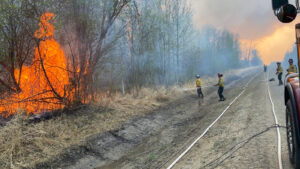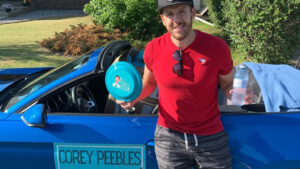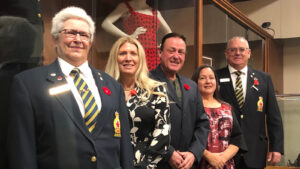Heading into the new year and beyond, the Town of Drayton Valley’s administration will be led by Robert Osmond.
Last week town council approved an employment agreement which will see Osmond take on the role of Chief Administrative Officer on a permanent basis.
“I’m looking forward to the next few years of working together,” said Mayor Nancy Dodds. “It makes it a little bit easier now that we know you’re going to be here for the long run.”
Osmond was initially appointed as interim CAO in mid-September. The town has been without a permanent CAO since Winston Rossouw stepped down in January.
Councillor Tom McGee also welcomed Osmond’s appointment.
“I do appreciate the value you bring to this table and to the community,” he said.
What Osmond brings includes 15 years of experience in municipal government. He has spent periods as assistant CAO in Lac St. Anne County and acting CAO in both Wetaskiwin and Redcliff.
As Chief Administrative Officer Osmond’s role is to oversee the day-to-day operations of the Town. As the administrative head of the municipality, the CAO ensures that municipal policies and programs are implemented and advises and informs council on the operation and affairs of the municipality.
Businesses will see some changes to the local Rural Renewal Stream program come into effect on November 13.
The program, offered through the Alberta Advantage Immigration Program, allows business owners to bring in skilled workers from outside of the province or country. It also allows business owners who employ staff on a Temporary Work Visa to endorse them for permanent residency through the program.
At the October 30 town council meeting, Kundiso Nyambirai, the growth services manager, explained that they had 300 applications that they were reviewing. Between March 2023 and August 2024, the Town had endorsed 200 of those applications for consideration to the Province.
Nyambirai explained that the Province has now put a system into place to make it easier to sort through the applications on their end.
The points based system gives a better idea of which applications are most likely to be considered or approved for those municipalities endorsing them. Nyambirai says his department is reviewing the applications to see which ones would have enough points to be considered by the Province.
However, the Province is limited in the number of applications that it can put through. There are more than 70 municipalities and districts participating in the program, and the Province only has 1,900 spots they can approve in 2024.
“We are over-subscribing,” says Nyambirai. “We are endorsing 200 plus people.”
In August, the Town decided to make some changes to the way that the program would work in the community. This included limiting the number of applications to 100 each year, while also limiting the number of applications a business can submit to five. Nyambirai also suggested that limiting applications to workers who already resided in the community could help to ensure that the Town does have housing available for these applicants.
Nyambirai says the Province is currently sorting through 1,000 applications to decide on the remaining spots for the year. Councillor Monika Sherriffs agreed that the Town is sending in a higher than average amount of endorsements, stating that if there are 1,000 being considered and Drayton Valley has sent in 200, then we would be sending in many more applications than other municipalities.
Councillor Amila Gammana disagreed, saying that he believed other communities are likely doing the same. He says the real question is how many of those endorsements are receiving approval from the Province.
Nyambirai says that the municipalities are not made aware of which endorsements are approved. He says that looking into that number by contacting applicants would be very time consuming, so they cannot be sure how many of Drayton Valley’s businesses’ applications have been accepted for the program.
Five creative ways to use print advertising to supercharge your business
Sponsored Content
In the age where there’s a constant drive for more and more content, coming up with ideas of how to promote your business can become a full time job on its own. I mean – you signed up to be a business owner right? Not a videographer, copywriter, or graphic designer. The good news is print advertising works differently from the social platforms that have you constantly chasing the next batch of likes and shares.
Print advertising with your local newspaper gets you off the hamster wheel and connects you with a copywriter, graphic designer, and an ad planner who are actually interested in learning the ins and outs of your business. This person or people will work with you to generate creative ideas within your marketing budget. With their help you can get your creative juices flowing again and find ways to not just push content but to craft creative content that will be seen and prompts action.
Print ads are consumed like fine wine. Readers look at print ads longer and deeper than they do the disruptive advertising found on other media platforms. Tell me in the last time that you’ve binge scrolled your social media feeds – How many ads do you actually remember seeing? I am betting, not many.
Print ads are non-disruptive content for newspaper readers and therefore get the attention they truly deserve. They have a longer lasting impact for readers, and after all, deepening the relationship with customers is really what you are looking to do.
So here are some ways you can position your local business with print advertising.
- Thought leadership: Be a thought leader in the regional landscape of your industry. Use an ad space for how-to content, data presentation on regional trends. Newspaper readers are readers and so are more likely to read long form advertisements with interesting information. You can reuse this information on your website blogs, social platforms, podcasts and the like.
- Be action oriented: Ads are there to move the needle forward. A call to action can be as simple as moving an interested person from the print ad to “Check out our online store” – print to digital is easy to do in both the print and digital formats of your local newspaper. Using click through options and QR codes to specific URLs makes the cross over from print to digital platforms seamless.
- Event marketing: Discovering local events in the community newspaper is one of the top interest points for local readers. But don’t just churn out a generic “Come to our event”. Remember our readers enjoy spending time with the paper. Capitalize on that. When you advertise an event in the newspaper you have an opportunity to make an intimate connection so don’t treat it like a fly by night ad. Make it engaging, personal, and relevant.
- Coupons and promotions: If you are a retailer or a restaurant that has deals and promotions, newspaper readers take notice! Not only does the use of coupons help you track the effectiveness of your ad it also gets people in the door where you can start to deepen your client relationship.
- Minimize or maximize. When people book a print ad they tend to want to throw everything into it. This creates a cluttered, hard to read ad. Instead take the space to promote your one product or service that tends to get people in the door, then cross promote once you are in contact with your prospective client. Alternatively you can also use the space to create an organized product catalogue, or flier page that showcases a number of products but in an organized and thematic fashion.
By contacting your local newspaper you don’t just get an ad, you expand your marketing team exponentially. You get access to our professionals and we help you to figure out the direction you are looking to go with your business.
Hard work and heritage reflected in 4-H
One local youth has seen his hard work with 4-H pay off after being selected as one of 12 youth to show their steers at the 2025 Calgary Stampede Junior Steer Classic.
Hunter Harris is a third generation 4-H member and has been part of the organization since he was 12 years old. Not only does he show cattle for 4-H, he’s also been entering open shows for the past two years. He says showing cattle is just a natural extension of his life as the son and grandson of farmers.
“I think it’s really important to know where your food comes from and I really enjoy showing,” says Harris. He says he also feels like he’s staying true to his heritage working in agriculture, which he is something he is proud of and wants to continue doing.
As an ambassador, Harris got his choice of steer from the OH Ranch this month. At the next Calgary Stampede, he will bring that steer back to show in the Calgary Stampede Junior Steer Classic under a special category for OH Beef.
He says being chosen as an ambassador is an honour and he’s excited to use the opportunity to help educate people about the importance of the industry.
“I think it means putting myself out there and trying to put out a positive image for both the Calgary Stampede and the beef industry as a whole,” says Harris. “As an ambassador, I feel I have the responsibility to try and promote the show world, the beef industry, and this way of life as much as I can.”
Beef showing a competitive sport
He says there is a lot of work that goes into showing and that he considers it a competitive sport, no different than horse showing or dog showing. Each year, Harris works with the steer or heifer he’s chosen. He’s responsible for feeding it, grooming it, and training it, which means spending time with it nearly every day for more than half a year.
“You’ve got to put in a ton of time. You have to be able to halter break it and get it tame,” says Harris. “There’s a process of training it to stand a certain way, how to respond to certain cues when you’re pulling on their halter, and how they should lead and behave in the show ring.”
It’s also important to put time into research about the proper feed for the steer. Harris says the type of food they are fed will greatly impact the standing in competition as well as the sale of the steer for butcher. He says there is a certain balance between fat and muscle that needs to be kept to make good meat.
At the show, all of the cattle get a fitting from the competitors to make sure they look their best when in the ring.
“It’s kind of like hairstyling, but for cows, in a sense,” he says.
Fitting involves cleaning the cow, blow drying them, clipping them, brushing tufts and styling them in certain ways to make the cow look its best in the show.
“It kind of brings out the best traits in them so they look like a better market animal,” he says.
Harris says he plans to attend more open shows this year and hopefully have the opportunity to help educate people about the industry. In the past, he’s spoken with young spectators at events who come up to see his cow and shared a little bit about the importance of the event.
“I just wanted to make sure they were enjoying themselves and that they learned something,” says Harris. “The ladies that were showing [the children] around were learning stuff, too. I think it’s really important to try and connect with everyone on all levels and tell them what an amazing sport it is and how important it is.”
He says that sometimes it can be sad to see the cow go after working with it for so long. But Harris says it’s important for him to remember why he is doing it in the first place, and that families will be fed well because of his efforts.
While Harris is still contemplating what the future could hold for himself in terms of a career, he’s pretty certain that he will likely end up working with cattle and in the agriculture industry. He’s already been working on building up his own herd with his time and money, and a little bit of help from his family. He feels that this will give him a headstart in life and also makes a good choice as an ambassador.
“My parents have been extremely supportive of it, and they’ve helped me out a ton,” he says.
Harris believes his experience in working with his herd makes him more knowledgeable about the industry. He’s been learning about the traditions and the work that goes into maintaining a herd, including breeding, feeding, and the general well-being of the animals.
“I think that makes me a better showman and in a better position to be an ambassador,” he says.
Those who wish to know how Harris’ steer holds up to the other 11 ambassadors will have to wait until the July 2025 Calgary Stampede or hope to catch him at one of the several shows he plans to attend.
Volleyball comes home to Tomahawk
Tomahawk to receive a $1 million dollar upgrade
For the first time ever, the Tomahawk School volleyball team was able to host a home game thanks to their new gym.
Tracey Gilmour, the new principal for the school, says the new gym was a $1 million project. It was started last May and was finally finished on October 16, hours before their opening game.
“They were bringing the scissor lift out as we brought in the net,” says Gilmour.
The Timberwolves went on to win their first home game against the Muir Lake Mustangs.
“They were a little bit worried that actually performing at home would put some pressure on them,” says Gilmour. “But they did great.”
“I was very nervous and excited at the same time,” says Layla Chausse, one of the Timberwolves.
Team practice was a challenge in the past
While the school has always had team sports, Gilmour says it’s been a challenge for the teams to practice, and they’ve never been able to host a game before. The size of the gym wasn’t necessarily the problem. The issue was a large stage that took up about a third of the space in the room.
Gilmour says the stage made it difficult for the students to play any type of sports in the gym. She says small games could work, but a full sized game wasn’t possible.
The previous principal, Fran Bell, really advocated for the students saying they should have equal opportunities to access sports and extracurriculars.
“Parkland School Division stepped up and made that investment in our school,” says Gilmour.
After years of playing away games, the team was happy to finally get to play on their home turf.
“It was really nice to play in the gym for the first time,” says Josie Woodruff, one of the players. “We’re especially grateful to be able to play a home game.” She says their team has never had the opportunity to play in a new gym before.
The fact that they were the very first people to use the gym was something the team enjoyed, as well.
Strocher says winning is just icing on the cake
“We were really excited to have our first home game and be the first ones to play in that gym,” says Isabelle Strocher. She says winning that first game was just icing on the cake.
Up until the home opener, the girls had been practicing outside on a paved area near the school. Gilmour says it hasn’t been easy for the team, but they persevered, and had won every single game going into the home opener.
“Honestly, I think what got them through was their amazing team spirit,” says Gilmour. “I’ve never seen anything like it. They’re so supportive of each other.”
That team spirit has helped the Timberwolves make it into the playoffs this year.
“We’ve finished our placement games,” says Judith Munch. “Now we just have playoffs, and we’re hoping to host one, too.”
Meeting calls for change in town
Members of business community voice concerns over local issues
Some local businesses gathered last week to voice concerns, propose possible solutions, and brainstorm a presentation to put before town council.
Erik Bergen, one of the owners of the Drayton Valley Bakery, held a meeting on October 9 and invited all businesses in the community to come out. Bergen wanted to hear their thoughts on three specific topics: homelessness, essential service administration and the Town’s free enterprise policy.
Bergen says the idea about having a presentation has been on his mind for several months. He says he’s spoken to many business owners who feel frustrated with the Town and the direction council is taking. However, he says he felt that if everybody only talked about it and no one went to the town, nothing would get accomplished.
Along with business owners, the organizers of Warming Hearts and members of the public attended the event.
Homelessness and franchises stir debate
Bergen prepared a presentation for the event, and reviewed it several times as people came and went as they were able. He also had a petition available for attendees to sign.
As he went over his presentation, Bergen says it was difficult to focus on the problems and solutions rather than opinions.
“It did derail a little bit, just because of the opposite points of view, especially regarding the homeless,” he says.
There were some attendees who viewed the homeless issue from a more humanitarian point of view and others that felt a heavier hand was needed. But Bergen says it’s important to
remember that not all homeless people are causing the issue. There are some individuals who are making it difficult for everyone.
“I don’t want to group all people into one basket,” says Bergen. “There are people who are homeless because their house burned down or were dealt a bad hand.”
Another topic that brought up differing opinions was new franchises coming into the community. In his presentation, Bergen argued that by simply leaving the door open for any new businesses in the community, council was putting a strain on businesses that were already established.
According to Bergen, there is about one restaurant (or registered kitchen) for every 95 people in the community. There are more than eight liquor stores and six cannabis stores, 12 pizza places and more than one of some franchises.
He believes that a lack of direction from council in this matter is making it difficult for businesses to do well. Bergen says his concern is protecting the current businesses that the town already has in place and allow them to flourish.
“A lot of these restaurant owners say that they’re one franchise away from closing their doors,” says Bergen.
Town services and the need for improvement
Bergen says that many people have also noticed a disparity in the services the Town offers the community. For example, there are a number of different “nice” things the Town has spent money on like the pumptrack, disc golf, the pool etc. However, there are some struggles with providing basic services such as regular road maintenance, weed control and pest management.
“Maybe they are doing the best they can do, or maybe they got pushed to the back burner,” says Bergen.
He says that he got a lot of feedback from those who attended the meeting. As it was his first time attempting anything like this, there was a learning curve and Bergen says he’s looking forward to making improvements at another meeting that will be held at the beginning of November.
Bergen’s plan is to present a list of complaints with possible solutions to council in November.
Town changing Facility Code of Conduct
The Town is making some changes to its Facility Code of Conduct in an effort to ensure its facilities aren’t being misused.
Cody Rossing, the manager of enforcement and emergency management, presented council with a proposed amendment to the Code of Conduct. Rossing says the Code of Conduct was put in place in August 2016. Since council expressed concern surrounding enforcement of removing homeless individuals from the Civic Centre vestibule, administration reviewed the code and came up with some suggestions.
Rossing says there are several different prohibitions that were not included in the original Code of Conduct. Most of the changes were stronger wording surrounding loitering and failing to comply with signage. While the original code prohibited smoking, it did not mention vaping, so Rossing says they have changed that.
The wording surrounding service animals was also changed to match provincial law.
The proposed changes also give more power to facility managers when it comes to banning individuals from Town facilities. They will be able to ban individuals for up to seven days. General managers and peace officers will also be able to suspend someone for up to six months. CAOs will be able to ban someone for more than six months if necessary.
“It’s putting in those different layers so the CAO isn’t involved in everything,” says Rossing.
He says there are also changes to wording surrounding the appeals process of someone who has been banned for more than 24 hours.
“And it clarifies that if someone is contravening their suspension or expulsion, then they are considered trespassing and law enforcement will be made aware for further actions,” says Rossing.
Councillor Colin Clarke raised concerns about the bans, asking if a ban from Town facilities meant all Town-owned buildings, even if there were tennants operating out of some of them. He says he worried that banning someone from the Omniplex might affect their ability to go to the Food Bank or other necessary services.
Hans van Klaveren, the acting CAO, says that typically the operator is setting those guidelines or rules for their building.
Councillor Tom McGee also spoke about the Warming Hearts Centre as the Town helps to fund the rent for the facility through grants.
In the end, it was decided that if a tenant wanted to have someone trespassed, they would contact Rossing and it would be treated like other businesses in the community. Their bans will only apply to Town owned and operated facilities.
“I’m glad to see we’re addressing this and putting the structure in place to give you the tools to do something about it,” says Councillor Rick Evans.
“I think that, in the end, our residents are going to appreciate our efforts to make the use of our facilities more enjoyable and safe, ultimately.”
Osmond thanked council for the opportunity and said he was looking forward to getting to work on a permanent basis.
“I’m certainly very excited about the things we’re going to do together,” he said.
Businesses will see some changes to the local Rural Renewal Stream program come into effect on November 13.
The program, offered through the Alberta Advantage Immigration Program, allows business owners to bring in skilled workers from outside of the province or country. It also allows business owners who employ staff on a Temporary Work Visa to endorse them for permanent residency through the program.
At the October 30 town council meeting, Kundiso Nyambirai, the growth services manager, explained that they had 300 applications that they were reviewing. Between March 2023 and August 2024, the Town had endorsed 200 of those applications for consideration to the Province.
Nyambirai explained that the Province has now put a system into place to make it easier to sort through the applications on their end.
The points based system gives a better idea of which applications are most likely to be considered or approved for those municipalities endorsing them. Nyambirai says his department is reviewing the applications to see which ones would have enough points to be considered by the Province.
However, the Province is limited in the number of applications that it can put through. There are more than 70 municipalities and districts participating in the program, and the Province only has 1,900 spots they can approve in 2024.
“We are over-subscribing,” says Nyambirai. “We are endorsing 200 plus people.”
In August, the Town decided to make some changes to the way that the program would work in the community. This included limiting the number of applications to 100 each year, while also limiting the number of applications a business can submit to five. Nyambirai also suggested that limiting applications to workers who already resided in the community could help to ensure that the Town does have housing available for these applicants.
Nyambirai says the Province is currently sorting through 1,000 applications to decide on the remaining spots for the year. Councillor Monika Sherriffs agreed that the Town is sending in a higher than average amount of endorsements, stating that if there are 1,000 being considered and Drayton Valley has sent in 200, then we would be sending in many more applications than other municipalities.
Councillor Amila Gammana disagreed, saying that he believed other communities are likely doing the same. He says the real question is how many of those endorsements are receiving approval from the Province.
Nyambirai says that the municipalities are not made aware of which endorsements are approved. He says that looking into that number by contacting applicants would be very time consuming, so they cannot be sure how many of Drayton Valley’s businesses’ applications have been accepted for the program.
Sponsored Content
In the age where there’s a constant drive for more and more content, coming up with ideas of how to promote your business can become a full time job on its own. I mean – you signed up to be a business owner right? Not a videographer, copywriter, or graphic designer. The good news is print advertising works differently from the social platforms that have you constantly chasing the next batch of likes and shares.
Print advertising with your local newspaper gets you off the hamster wheel and connects you with a copywriter, graphic designer, and an ad planner who are actually interested in learning the ins and outs of your business. This person or people will work with you to generate creative ideas within your marketing budget. With their help you can get your creative juices flowing again and find ways to not just push content but to craft creative content that will be seen and prompts action.
Print ads are consumed like fine wine. Readers look at print ads longer and deeper than they do the disruptive advertising found on other media platforms. Tell me in the last time that you’ve binge scrolled your social media feeds – How many ads do you actually remember seeing? I am betting, not many.
Print ads are non-disruptive content for newspaper readers and therefore get the attention they truly deserve. They have a longer lasting impact for readers, and after all, deepening the relationship with customers is really what you are looking to do.
So here are some ways you can position your local business with print advertising.
- Thought leadership: Be a thought leader in the regional landscape of your industry. Use an ad space for how-to content, data presentation on regional trends. Newspaper readers are readers and so are more likely to read long form advertisements with interesting information. You can reuse this information on your website blogs, social platforms, podcasts and the like.
- Be action oriented: Ads are there to move the needle forward. A call to action can be as simple as moving an interested person from the print ad to “Check out our online store” – print to digital is easy to do in both the print and digital formats of your local newspaper. Using click through options and QR codes to specific URLs makes the cross over from print to digital platforms seamless.
- Event marketing: Discovering local events in the community newspaper is one of the top interest points for local readers. But don’t just churn out a generic “Come to our event”. Remember our readers enjoy spending time with the paper. Capitalize on that. When you advertise an event in the newspaper you have an opportunity to make an intimate connection so don’t treat it like a fly by night ad. Make it engaging, personal, and relevant.
- Coupons and promotions: If you are a retailer or a restaurant that has deals and promotions, newspaper readers take notice! Not only does the use of coupons help you track the effectiveness of your ad it also gets people in the door where you can start to deepen your client relationship.
- Minimize or maximize. When people book a print ad they tend to want to throw everything into it. This creates a cluttered, hard to read ad. Instead take the space to promote your one product or service that tends to get people in the door, then cross promote once you are in contact with your prospective client. Alternatively you can also use the space to create an organized product catalogue, or flier page that showcases a number of products but in an organized and thematic fashion.
By contacting your local newspaper you don’t just get an ad, you expand your marketing team exponentially. You get access to our professionals and we help you to figure out the direction you are looking to go with your business.
One local youth has seen his hard work with 4-H pay off after being selected as one of 12 youth to show their steers at the 2025 Calgary Stampede Junior Steer Classic.
Hunter Harris is a third generation 4-H member and has been part of the organization since he was 12 years old. Not only does he show cattle for 4-H, he’s also been entering open shows for the past two years. He says showing cattle is just a natural extension of his life as the son and grandson of farmers.
“I think it’s really important to know where your food comes from and I really enjoy showing,” says Harris. He says he also feels like he’s staying true to his heritage working in agriculture, which he is something he is proud of and wants to continue doing.
As an ambassador, Harris got his choice of steer from the OH Ranch this month. At the next Calgary Stampede, he will bring that steer back to show in the Calgary Stampede Junior Steer Classic under a special category for OH Beef.
He says being chosen as an ambassador is an honour and he’s excited to use the opportunity to help educate people about the importance of the industry.
“I think it means putting myself out there and trying to put out a positive image for both the Calgary Stampede and the beef industry as a whole,” says Harris. “As an ambassador, I feel I have the responsibility to try and promote the show world, the beef industry, and this way of life as much as I can.”
Beef showing a competitive sport
He says there is a lot of work that goes into showing and that he considers it a competitive sport, no different than horse showing or dog showing. Each year, Harris works with the steer or heifer he’s chosen. He’s responsible for feeding it, grooming it, and training it, which means spending time with it nearly every day for more than half a year.
“You’ve got to put in a ton of time. You have to be able to halter break it and get it tame,” says Harris. “There’s a process of training it to stand a certain way, how to respond to certain cues when you’re pulling on their halter, and how they should lead and behave in the show ring.”
It’s also important to put time into research about the proper feed for the steer. Harris says the type of food they are fed will greatly impact the standing in competition as well as the sale of the steer for butcher. He says there is a certain balance between fat and muscle that needs to be kept to make good meat.
At the show, all of the cattle get a fitting from the competitors to make sure they look their best when in the ring.
“It’s kind of like hairstyling, but for cows, in a sense,” he says.
Fitting involves cleaning the cow, blow drying them, clipping them, brushing tufts and styling them in certain ways to make the cow look its best in the show.
“It kind of brings out the best traits in them so they look like a better market animal,” he says.
Harris says he plans to attend more open shows this year and hopefully have the opportunity to help educate people about the industry. In the past, he’s spoken with young spectators at events who come up to see his cow and shared a little bit about the importance of the event.
“I just wanted to make sure they were enjoying themselves and that they learned something,” says Harris. “The ladies that were showing [the children] around were learning stuff, too. I think it’s really important to try and connect with everyone on all levels and tell them what an amazing sport it is and how important it is.”
He says that sometimes it can be sad to see the cow go after working with it for so long. But Harris says it’s important for him to remember why he is doing it in the first place, and that families will be fed well because of his efforts.
While Harris is still contemplating what the future could hold for himself in terms of a career, he’s pretty certain that he will likely end up working with cattle and in the agriculture industry. He’s already been working on building up his own herd with his time and money, and a little bit of help from his family. He feels that this will give him a headstart in life and also makes a good choice as an ambassador.
“My parents have been extremely supportive of it, and they’ve helped me out a ton,” he says.
Harris believes his experience in working with his herd makes him more knowledgeable about the industry. He’s been learning about the traditions and the work that goes into maintaining a herd, including breeding, feeding, and the general well-being of the animals.
“I think that makes me a better showman and in a better position to be an ambassador,” he says.
Those who wish to know how Harris’ steer holds up to the other 11 ambassadors will have to wait until the July 2025 Calgary Stampede or hope to catch him at one of the several shows he plans to attend.
Tomahawk to receive a $1 million dollar upgrade
For the first time ever, the Tomahawk School volleyball team was able to host a home game thanks to their new gym.
Tracey Gilmour, the new principal for the school, says the new gym was a $1 million project. It was started last May and was finally finished on October 16, hours before their opening game.
“They were bringing the scissor lift out as we brought in the net,” says Gilmour.
The Timberwolves went on to win their first home game against the Muir Lake Mustangs.
“They were a little bit worried that actually performing at home would put some pressure on them,” says Gilmour. “But they did great.”
“I was very nervous and excited at the same time,” says Layla Chausse, one of the Timberwolves.
Team practice was a challenge in the past
While the school has always had team sports, Gilmour says it’s been a challenge for the teams to practice, and they’ve never been able to host a game before. The size of the gym wasn’t necessarily the problem. The issue was a large stage that took up about a third of the space in the room.
Gilmour says the stage made it difficult for the students to play any type of sports in the gym. She says small games could work, but a full sized game wasn’t possible.
The previous principal, Fran Bell, really advocated for the students saying they should have equal opportunities to access sports and extracurriculars.
“Parkland School Division stepped up and made that investment in our school,” says Gilmour.
After years of playing away games, the team was happy to finally get to play on their home turf.
“It was really nice to play in the gym for the first time,” says Josie Woodruff, one of the players. “We’re especially grateful to be able to play a home game.” She says their team has never had the opportunity to play in a new gym before.
The fact that they were the very first people to use the gym was something the team enjoyed, as well.
Strocher says winning is just icing on the cake
“We were really excited to have our first home game and be the first ones to play in that gym,” says Isabelle Strocher. She says winning that first game was just icing on the cake.
Up until the home opener, the girls had been practicing outside on a paved area near the school. Gilmour says it hasn’t been easy for the team, but they persevered, and had won every single game going into the home opener.
“Honestly, I think what got them through was their amazing team spirit,” says Gilmour. “I’ve never seen anything like it. They’re so supportive of each other.”
That team spirit has helped the Timberwolves make it into the playoffs this year.
“We’ve finished our placement games,” says Judith Munch. “Now we just have playoffs, and we’re hoping to host one, too.”
Members of business community voice concerns over local issues
Some local businesses gathered last week to voice concerns, propose possible solutions, and brainstorm a presentation to put before town council.
Erik Bergen, one of the owners of the Drayton Valley Bakery, held a meeting on October 9 and invited all businesses in the community to come out. Bergen wanted to hear their thoughts on three specific topics: homelessness, essential service administration and the Town’s free enterprise policy.
Bergen says the idea about having a presentation has been on his mind for several months. He says he’s spoken to many business owners who feel frustrated with the Town and the direction council is taking. However, he says he felt that if everybody only talked about it and no one went to the town, nothing would get accomplished.
Along with business owners, the organizers of Warming Hearts and members of the public attended the event.
Homelessness and franchises stir debate
Bergen prepared a presentation for the event, and reviewed it several times as people came and went as they were able. He also had a petition available for attendees to sign.
As he went over his presentation, Bergen says it was difficult to focus on the problems and solutions rather than opinions.
“It did derail a little bit, just because of the opposite points of view, especially regarding the homeless,” he says.
There were some attendees who viewed the homeless issue from a more humanitarian point of view and others that felt a heavier hand was needed. But Bergen says it’s important to
remember that not all homeless people are causing the issue. There are some individuals who are making it difficult for everyone.
“I don’t want to group all people into one basket,” says Bergen. “There are people who are homeless because their house burned down or were dealt a bad hand.”
Another topic that brought up differing opinions was new franchises coming into the community. In his presentation, Bergen argued that by simply leaving the door open for any new businesses in the community, council was putting a strain on businesses that were already established.
According to Bergen, there is about one restaurant (or registered kitchen) for every 95 people in the community. There are more than eight liquor stores and six cannabis stores, 12 pizza places and more than one of some franchises.
He believes that a lack of direction from council in this matter is making it difficult for businesses to do well. Bergen says his concern is protecting the current businesses that the town already has in place and allow them to flourish.
“A lot of these restaurant owners say that they’re one franchise away from closing their doors,” says Bergen.
Town services and the need for improvement
Bergen says that many people have also noticed a disparity in the services the Town offers the community. For example, there are a number of different “nice” things the Town has spent money on like the pumptrack, disc golf, the pool etc. However, there are some struggles with providing basic services such as regular road maintenance, weed control and pest management.
“Maybe they are doing the best they can do, or maybe they got pushed to the back burner,” says Bergen.
He says that he got a lot of feedback from those who attended the meeting. As it was his first time attempting anything like this, there was a learning curve and Bergen says he’s looking forward to making improvements at another meeting that will be held at the beginning of November.
Bergen’s plan is to present a list of complaints with possible solutions to council in November.
The Town is making some changes to its Facility Code of Conduct in an effort to ensure its facilities aren’t being misused.
Cody Rossing, the manager of enforcement and emergency management, presented council with a proposed amendment to the Code of Conduct. Rossing says the Code of Conduct was put in place in August 2016. Since council expressed concern surrounding enforcement of removing homeless individuals from the Civic Centre vestibule, administration reviewed the code and came up with some suggestions.
Rossing says there are several different prohibitions that were not included in the original Code of Conduct. Most of the changes were stronger wording surrounding loitering and failing to comply with signage. While the original code prohibited smoking, it did not mention vaping, so Rossing says they have changed that.
The wording surrounding service animals was also changed to match provincial law.
The proposed changes also give more power to facility managers when it comes to banning individuals from Town facilities. They will be able to ban individuals for up to seven days. General managers and peace officers will also be able to suspend someone for up to six months. CAOs will be able to ban someone for more than six months if necessary.
“It’s putting in those different layers so the CAO isn’t involved in everything,” says Rossing.
He says there are also changes to wording surrounding the appeals process of someone who has been banned for more than 24 hours.
“And it clarifies that if someone is contravening their suspension or expulsion, then they are considered trespassing and law enforcement will be made aware for further actions,” says Rossing.
Councillor Colin Clarke raised concerns about the bans, asking if a ban from Town facilities meant all Town-owned buildings, even if there were tennants operating out of some of them. He says he worried that banning someone from the Omniplex might affect their ability to go to the Food Bank or other necessary services.
Hans van Klaveren, the acting CAO, says that typically the operator is setting those guidelines or rules for their building.
Councillor Tom McGee also spoke about the Warming Hearts Centre as the Town helps to fund the rent for the facility through grants.
In the end, it was decided that if a tenant wanted to have someone trespassed, they would contact Rossing and it would be treated like other businesses in the community. Their bans will only apply to Town owned and operated facilities.
“I’m glad to see we’re addressing this and putting the structure in place to give you the tools to do something about it,” says Councillor Rick Evans.
“I think that, in the end, our residents are going to appreciate our efforts to make the use of our facilities more enjoyable and safe, ultimately.”
Drayton Valley Ski Hill Closes After 60 Years | Challenges with Weather, Insurance, and Volunteers
After 60 years of operation in the community, the Drayton Valley ski hill has closed its doors.
Randy Beckett, the president of the Drayton Valley Brazeau Snow Club, says there were three main factors that went into the decision to shut down: weather, insurance, and lack of volunteers.

Drayton Valley Food Bank relies on generosity
Explore the growing demand for the Drayton Valley Food Bank as it tackles record-breaking hamper distribution, facility challenges, and rising standards. Learn how community generosity keeps the vital service thriving in Alberta despite obstacles.”

Drayton Valley Launches Platform to Match Volunteers with Opportunities
Discover how Drayton Valley’s new online platform, This Is Drayton Valley (TIDV), connects volunteers with local organizations. Simplify finding meaningful opportunities to share your skills and make a difference in the community.

Man charged after shooting near Brazeau Dam
An Edmonton man has been charged with attempted murder after an incident that took place near the Brazeau Dam last week.






















